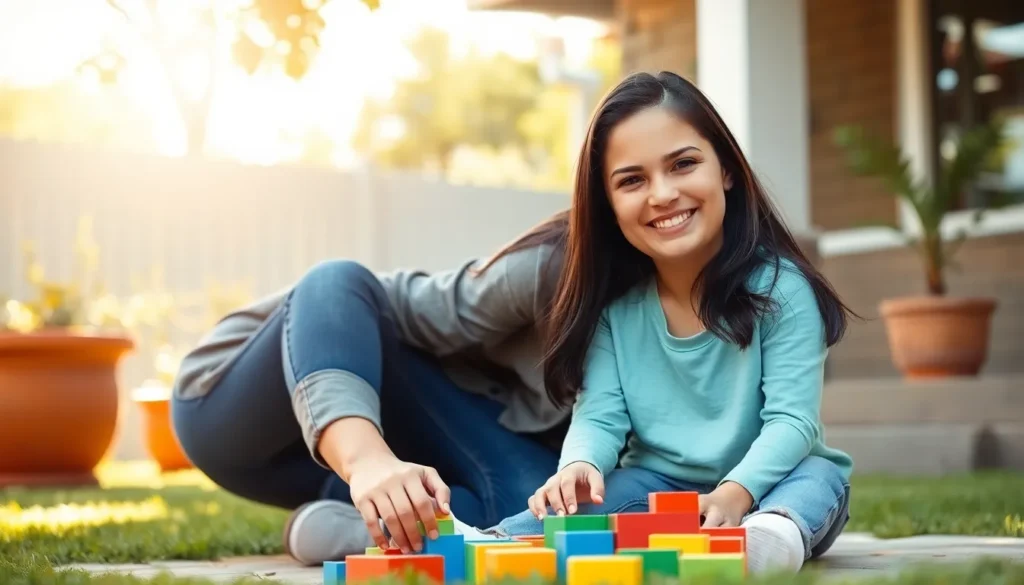Table of Contents
ToggleIn a world filled with challenges and distractions, positive parenting stands out as a transformative approach to raising children. This method emphasizes nurturing, understanding, and support, fostering a strong bond between parents and their kids. By focusing on encouragement rather than criticism, parents can create an environment where children thrive emotionally and socially.
Positive parenting isn’t just about discipline; it’s about teaching valuable life skills and instilling confidence. It encourages open communication and mutual respect, shaping resilient individuals capable of navigating life’s ups and downs. As families face modern pressures, embracing these principles can lead to healthier relationships and happier homes.
Understanding Positive Parenting
Positive parenting refers to an approach that nurtures and supports children’s emotional and social development. It creates a foundation for strong relationships and effective communication between parents and children.
Definition and Principles
Positive parenting encompasses strategies that emphasize empathy, respect, and constructive guidance. Key principles include:
- Nurturing Relationships: Developing strong, loving bonds through consistent emotional support.
- Encouragement over Criticism: Focusing on positive behaviors rather than reprimanding mistakes fosters self-esteem.
- Open Communication: Establishing a dialogue that encourages children to express thoughts and feelings promotes understanding.
- Modeling Behavior: Demonstrating desirable behaviors teaches children through observation and imitation.
- Skill Development: Teaching problem-solving and decision-making skills equips children for life’s challenges.
Benefits of Positive Parenting
Positive parenting offers numerous advantages for families and children, including:
- Enhanced Emotional Intelligence: Children develop better emotional regulation through supportive interactions.
- Improved Behavioral Outcomes: Reduced behavioral issues occur as children feel secure and understood.
- Stronger Parent-Child Bonds: Deepened connections lead to trust and open communication.
- Higher Academic Performance: Encouragement helps children build confidence, which can enhance learning outcomes.
- Healthier Family Dynamics: Positive interactions contribute to a harmonious home environment, reducing conflicts and stress.
Implementing positive parenting principles fosters a nurturing atmosphere, promoting well-rounded development and thriving family relationships.
Key Techniques of Positive Parenting

Positive parenting employs techniques that foster healthy relationships and promote children’s growth. Key methods include effective communication and providing encouragement and support.
Effective Communication
Effective communication forms the backbone of positive parenting. Parents can ensure their messages are clear and age-appropriate. Maintaining eye contact fosters connection and understanding. Active listening encourages children to express their thoughts and feelings freely. Asking open-ended questions, such as “What do you think about this?” or “How did that make you feel?” promotes dialogue. Offering validation reinforces children’s emotions, showing that their opinions matter.
Encouragement And Support
Encouragement and support bolster children’s self-esteem and motivation. Parents can use specific praise, focusing on effort rather than results, such as saying, “I noticed how hard you worked on that project.” Providing opportunities for independent problem-solving fosters resilience. Being present during challenges offers emotional support and reassurance. Affectionate gestures, like hugs, communicate unconditional love and acceptance, strengthening the parent-child bond.
Challenges in Positive Parenting
Positive parenting presents various challenges that parents navigate while fostering nurturing environments. Understanding these obstacles fosters awareness and promotes effective strategies.
Common Misconceptions
Misconceptions often arise regarding positive parenting practices. Many believe that positive parenting equates to permissiveness, leading to a lack of discipline. Some think positive parenting eliminates rules or structure; however, it emphasizes boundaries framed with understanding. Others assume that positive parenting doesn’t address behavioral issues; yet, it encourages constructive methods for correcting behavior without resorting to harsh punishment. Additionally, many feel that positive parenting lacks effectiveness in instilling accountability; reality shows that teaching consequences through natural outcomes fosters responsibility and self-regulation.
Dealing with Difficult Situations
Difficult situations frequently occur in the parenting journey. For instance, when children display defiance, parents can apply de-escalation techniques like deep breathing and calm discussions. Conflict resolution skills become invaluable during disagreements, requiring parents to model respectful communication. Significant changes, such as moving or divorce, can trigger emotional responses. In these instances, open conversations about feelings and changes are crucial for helping children process their emotions. Parents can also display empathy and patience, supporting children as they adapt. Situations involving peer influence or bullying necessitate proactive engagement; parents must encourage open dialogue about experiences, building trust and guiding children through challenges.
Implementing Positive Parenting Strategies
Implementing positive parenting strategies requires intentional actions and consistent behaviors that foster healthy child development. Two essential areas to focus on are creating a positive home environment and building strong relationships.
Creating a Positive Home Environment
Creating a positive home environment involves establishing a space that promotes safety, respect, and security. Key elements include:
- Consistent Routines: Establishing and maintaining daily routines helps children feel secure and understand expectations. Regular meal times and bedtime rituals foster stability.
- Open Communication: Encouraging open dialogues allows children to express their thoughts freely. Parents should actively listen without interrupting, reinforcing that their child’s voice matters.
- Emotional Safety: Nurturing emotional safety means validating feelings and providing reassurance. Children experiencing stress or anxiety need a comforting atmosphere to express their emotions.
- Physical Space: Designing an inviting physical space with areas for play, learning, and relaxation encourages exploration and creativity. Children thrive in environments that stimulate their imagination and curiosity.
- Positive Reinforcement: Implementing positive reinforcement for desired behaviors strengthens good habits. Rewards can include verbal praise, stickers, or extra playtime, motivating children to continue exhibiting positive actions.
Building Strong Relationships
Building strong relationships between parents and children serves as the foundation for healthy development. Essential strategies include:
- Quality Time: Spending quality time together strengthens bonds. Engaging in shared activities, such as cooking or playing games, fosters connection and promotes mutual understanding.
- Active Listening: Practicing active listening entails giving full attention when a child speaks. Parents should maintain eye contact and summarize what the child says, ensuring they feel heard and understood.
- Affectionate Interaction: Demonstrating affection through hugs, verbal affirmations, and gentle touches nurtures a child’s emotional well-being. Regular affection cultivates a sense of worth and security.
- Modeling Behavior: Parents should model the behaviors they wish to instill. Demonstrating respect, kindness, and resilience teaches children these essential values through observation.
- Encouraging Independence: Allowing children to make choices and solve problems independently builds confidence. Encouragement during challenging tasks fosters a sense of achievement, reinforcing their ability to handle future situations.
Implementing these strategies fosters a nurturing and empowering environment, enhancing children’s emotional and social development while strengthening parent-child relationships.
Embracing positive parenting can profoundly impact family dynamics and children’s development. By prioritizing nurturing relationships and open communication, parents create a supportive atmosphere that fosters emotional and social growth. This approach not only strengthens the parent-child bond but also equips children with essential life skills and confidence.
As families navigate challenges together, positive parenting principles encourage resilience and understanding. By focusing on encouragement rather than criticism, parents can cultivate a home environment where children feel valued and empowered. Ultimately, adopting these strategies leads to happier homes and healthier relationships, laying the groundwork for a brighter future.







